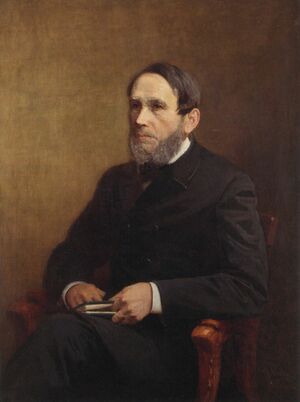Yakov Grot: Difference between revisions
m (1 revision imported) |
mNo edit summary |
||
| Line 2: | Line 2: | ||
Russian academic and philologist (b. 15/27 December 1812 in [[Saint Petersburg]]; d. 24 May/5 June 1893 in [[Saint Petersburg]]), born '''''Yakov Karlovich Grot''''' (Яков Карлович Грот). | Russian academic and philologist (b. 15/27 December 1812 in [[Saint Petersburg]]; d. 24 May/5 June 1893 in [[Saint Petersburg]]), born '''''Yakov Karlovich Grot''''' (Яков Карлович Грот). | ||
A graduate of the [[Tsarskoye Selo]] Lyceum, he became a professor at Helsinki University in 1840. In 1858 he became a member of the Russian Imperial Academy of Sciences, later serving as its chairman (from 1884) and vice-president (from 1889). Grot was also the Russian language tutor to the future emperors [[Alexander II]] and [[Alexander III]]. | A graduate of the [[Tsarskoye Selo]] Lyceum, he became a professor at Helsinki University in 1840. In 1858, he became a member of the Russian Imperial Academy of Sciences, later serving as its chairman (from 1884) and vice-president (from 1889). Grot was also the Russian language tutor to the future emperors [[Alexander II]] and [[Alexander III]]. | ||
His translations of German and Scandinavian poetry were well known during his lifetime; however, it was for his studies on the orthography, lexicography and grammar of the Russian language that he is most remembered. In 1892 Grot invited Tchaikovsky to assist with editing some of the entries for musical terms in his new ''[[Dictionary of the Russian Language]]'' (Словарь русского языка), TH 321. | His translations of German and Scandinavian poetry were well known during his lifetime; however, it was for his studies on the orthography, lexicography and grammar of the Russian language that he is most remembered. In 1892, Grot invited Tchaikovsky to assist with editing some of the entries for musical terms in his new ''[[Dictionary of the Russian Language]]'' (Словарь русского языка), TH 321. | ||
==Correspondence with Tchaikovsky== | ==Correspondence with Tchaikovsky== | ||
Revision as of 22:01, 6 December 2022
Russian academic and philologist (b. 15/27 December 1812 in Saint Petersburg; d. 24 May/5 June 1893 in Saint Petersburg), born Yakov Karlovich Grot (Яков Карлович Грот).
A graduate of the Tsarskoye Selo Lyceum, he became a professor at Helsinki University in 1840. In 1858, he became a member of the Russian Imperial Academy of Sciences, later serving as its chairman (from 1884) and vice-president (from 1889). Grot was also the Russian language tutor to the future emperors Alexander II and Alexander III.
His translations of German and Scandinavian poetry were well known during his lifetime; however, it was for his studies on the orthography, lexicography and grammar of the Russian language that he is most remembered. In 1892, Grot invited Tchaikovsky to assist with editing some of the entries for musical terms in his new Dictionary of the Russian Language (Словарь русского языка), TH 321.
Correspondence with Tchaikovsky
3 letters from Tchaikovsky to Yakov Grot have survived, dating from 1892 and 1893, all of which have been translated into English on this website:
- Letter 4685 – 10/22 May 1892, from Klin
- Letter 4793 – 29 October/10 November 1892, from Saint Petersburg
- Letter 4881 – 4/16 March 1893, from Klin
2 letters from Grot to the composer are preserved in the Klin House-Museum Archive.
Bibliography
- П. И. Чайковский. Сотрудник словаря Академий Наук (1933)
- П. И. Чайковский. Сотрудник словаря Академий Наук (1975)

